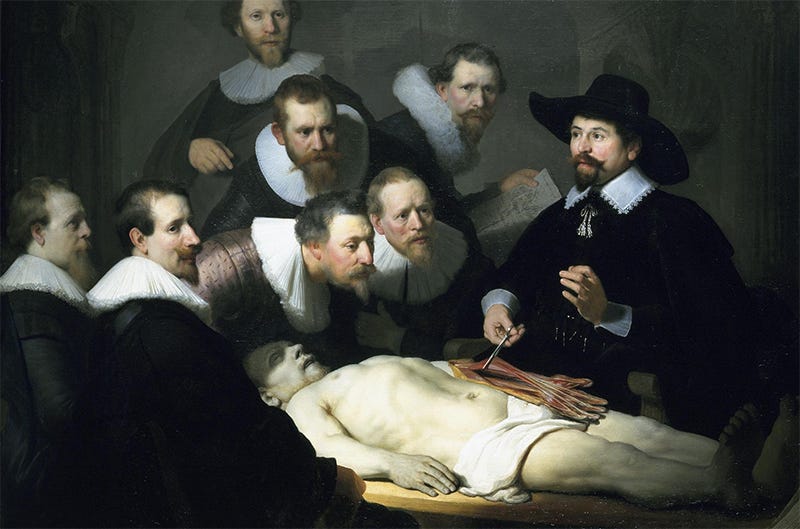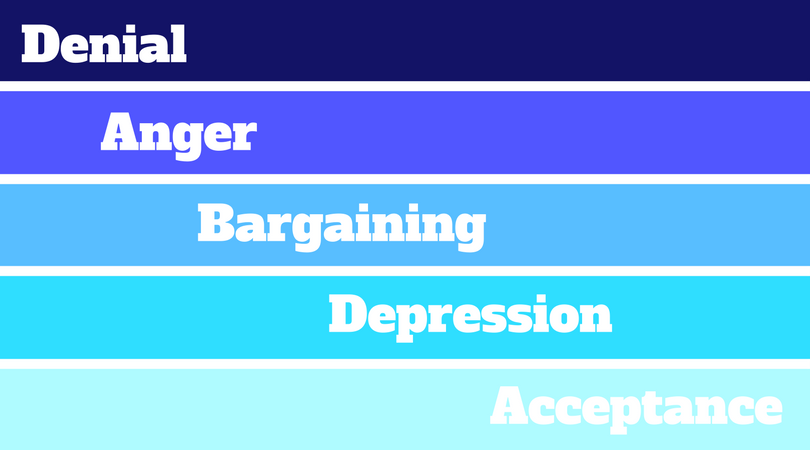Craft
Real Surgeons Can’t Cry: How Writing Healed a Doctor

by Bud Shaw

I was once a transplant surgeon. I arrived in Pittsburgh in the summer of 1981 to train under the world’s greatest transplant pioneer, Tom Starzl. Starzl and his team were six months into a new program that overnight would revolutionize liver transplantation, and by the spring of 1983, I was one of his key surgeons. I count my four years in Pittsburgh among the most thrilling times of my life, and I owe Tom for much of my professional success. In 1985, three colleagues and I left to start a new program in Nebraska.
Later this summer, some of the most intimate moments of my life will appear in a book that anyone can buy and read. And judge — not just the writing, but also me. My resume lists more than three hundred published journal articles, fifty book chapters, and over 225 invited lectures, but nothing in all of that work exposed me to the kind of scrutiny this book will allow. That was medical stuff; the book is personal, particularly in the way I explore my own fallibilities, including those of a surgeon.
A month ago, at our family’s annual Fourth of July gathering, my oldest niece asked me what the book was about.
I’m not sure, I said. I never know what else to say.
You really need a better answer than that, she said. Isn’t the book coming out soon?
Riding my bike yesterday, I started thinking about that question. Various scenes from the book, from my life, came and went: telling a man his wife had died during surgery; using invisible sutures to anastomose an artery in a two-week-old, two kilogram boy; standing on a cliff at Dead Horse Point with my hang glider afraid to jump; suffering a lecture from Tom Starzl about rocket ships to the stars; locking my office door, pulling the shades and hiding under my winter coat, too frightened to go on afternoon rounds.
And then I remembered a patient named Hannah and, still riding along on the flood plain north of Omaha, I burst into tears.
I gave Hannah a new liver when she was barely old enough to walk. In subsequent years, she came to every patient reunion in Omaha, and I began blaming her for the dread I felt in attending those events. Years passed and as the number of people attending the reunion swelled, my discomfiture with so much personal attention and worshiping grew exponentially. And there, always there, was Hannah, following me around, angling relentlessly for my attention. I thought her cute at first, but she soon became the evocation of everything I resented about having to attend those reunions. Eventually, I just stopped going.
Even so, Hannah kept in touch. She sent me newspaper clippings of her success on the soccer team and in the band. I got invitations to her high school and college graduations, and, a few years ago, to her wedding. I kept all of them, in a drawer with the cards and letters from hundreds of other patients.
Hannah died unexpectedly a month before her thirtieth birthday. Probably an infection that got out of control.
I burst into tears yesterday when I thought of Hannah in a scene from decades ago. Our transplant program was still a marvel to the community that year. With TV cameras rolling, I stood talking into a microphone with the governor of Nebraska about the meaning of those patient reunions, and there at my side was Hannah, tugging at my hand, holding up a finger painting that looked like a napkin smeared with mustard.
I regret that moment as much as any in my life. I resented a little girl who considered me her hero. I ignored her. Now I have written about it and I wonder what it reveals about me then, and whether I’ve changed.
I’ve had plenty of opportunities to change.
Thirteen years ago yesterday, the telephone rang and I found out the lump in my groin was malignant. For years after I finished treatment, I wondered why that day didn’t change me. Shouldn’t such bad news do that — force me to appreciate life, start living each day as though it were my last?
It didn’t. I approached cancer like I had every other difficult hurdle in my life, the same way I took on impossible surgical challenges and got through them. Surviving became another job. I completed it and moved on. No need to make any big changes in how I lived, day-to-day or otherwise.
Admittedly, I was very lucky. The tumor was early stage, and the chemotherapy and radiation were mostly just annoyances. Cancer couldn’t change me. I returned to work, even more secure in the notion that I could overcome pretty much anything.
That conceit wouldn’t last. Cancer might not have changed me, but an anxiety disorder would.
Of course, surgeons don’t suffer anxiety. That’s a given. We walk into the operating room as the supreme commander. We direct the troops, fight the battle, and win. The only requirement for wielding such hairy power is expertise. We just have to know what we’re doing.
Even so, on a sunny Sunday afternoon in January, I found myself seeking relief from panic under the covers in my darkened bedroom. I thought it might be brain metastases from my previously cured cancer. When anxiety attacked me again a few days later and again a week after that, I convinced the chairman of neurology to order an MRI scan of my brain. It was normal. I thought the problem might be hormonal but those tests were also normal. I tried to ignore it, to keep it a secret, but when it started to interfere with work — when I had to ask a colleague to fill in for me because I was locked in my office, the blinds pulled, hiding under my winter coat — I went to a real doctor who told me I had a form of mental illness and put me on drugs.
The pills helped, as did other treatment, but I still had breakthrough attacks. None had any identifiable triggers, but all involved a sense of impending doom. Sometimes I thought my cancer was coming back and felt around for lumps. Other times I worried about bats we found in our house, that one may have bit me or my son in our sleep and now one or both of us were going to die of rabies. I stopped taking night call and operating at night because I thought my cancer might have been caused by sleep deprivation, that it was just weeks away from recurring. I eventually stopped operating altogether, declaring that my administrative and other work required all of my attention. I couldn’t face the reality that my ongoing attacks required me to step away from the OR.
And then I began writing.
I’ve been writing for a long time, but I always shied away from true stories. In second grade, I wrote heroic stories involving a pony and an eight year-old boy and I edited them repeatedly until my mother’s praise turned unqualified. The first two years of medical school depressed me and I began submitting short stories to various magazines in hopes of starting a different career. Failure made me increasingly despondent, especially after Playboy Magazine rejected my brilliant story about a classroom demonstration of the anatomy and physiology of human sexual response. (It involved strategically placed “spy” cameras and an enthusiastic pair of volunteers.) By 1996, I was so utterly burned out with work that I spent most of my free time writing fiction. I finally took ten months off and wrote an 180,000-word novel that was mostly an escape from my professional life. It hides in the recesses of my hard drive where it belongs.
I never wrote an essay about real life until after I stopped operating. Three years after. At first I avoided the professional side of my life, writing mostly about the trials of youth. I knew that if I wanted to write more seriously, I would have to explore more serious stuff — the failures along with the successes, the terrifying and the joyful, the dark with the hopeful. To succeed, I had to be unconditionally honest, and for that I needed to find new perspectives, views of history free of agenda: no trying to set the record straight about what I thought really happened during all those years.
For much of my career, I found blaming failure on things outside my control was an expedient way to move on, especially when a patient died. Sometimes I could fault the patient. He was probably just too old and frail to have the transplant. She should have taken better care of herself; stopped smoking before the surgery. More than once, I blamed another surgeon. He shouldn’t have cut there; I knew it was wrong but he wouldn’t listen. The diagnosis was obvious; I was right all along. I don’t think I’m alone in handling failures that way.
After reading an advance copy of my book, a surgeon friend was worried that I’d gone too far. I’d pulled back the curtains on a part of our world that ought to remain private. The public won’t understand a lot of this; it hasn’t got the right context. I asked if she thought people would read it and ask for our heads. Maybe; you can’t trust people who don’t understand what goes on not to get upset.
I understand that some surgeons will think I go too far, not only in revealing how sometimes things can go horribly wrong in the OR, but also in exposing my own vulnerabilities. It’s clear I am not immune to error, and while the failings I reveal are mostly mine, the implications for all of us are there in the stories, and some surgeons won’t like that.
I don’t think making surgeons uncomfortable is a bad thing. I spent my career successfully avoiding self-reflection and I think that’s part of why, these days, I sometimes start crying when I least expect it, like when I remembered Hannah and found myself overwhelmed with regret over my chronic detachment. I was the proud victim of highly developed, wholly successful, and utterly unexamined instincts of self-protection. That’s how I dealt with the failures, the deaths, the suffering of so many people. Like a powerful immune response, my rational mind rejected it all, shielding my heart from the starker realities.
Those instincts worked for a long time, until they didn’t, until I lost the sanctuary of the operating room and ended up under the covers in a fetal position unable to understand why I felt so terrified. That’s when I started to write again. The drugs they put me on were unavoidable — they may always be so — but I don’t think they would be working so well without the self-reflection my writing requires. If that makes my confessional essays selfish, I’m not apologetic. I wish I’d taken it up long ago, before the shield became so durable.
In developing a less self-serving interpretation of events, I forced myself to see alternative conclusions, and ultimately, to deal with the evidence of my own failings. I don’t know that I could have done that were I still operating.
On the other hand, could I have continued operating had I worked to become so self-reflective before I quit?
I’d like to think so. I’d like to think that I could have learned not to be so cowardly, to be both mindful and effective. To be brave enough to admit how little I can control and yet go ahead, make the cut, do the transplant. All I know for sure is that getting here required me to write about it so that I could arrive at a place where exercise-induced endorphins, or whatever it was, can blow me so wonderfully apart. I didn’t want the sobbing to stop yesterday. I rarely cry, and I wanted it to last long enough to feel regenerative, to wash away some regret.
As the superhero in my own book chapter, I couldn’t face the adoration of survivors during our annual transplant patient reunions because I couldn’t deal with my own failures. I was just too self-absorbed to feel the love of men and women, boys and girls, all of whom deserved so much more than my irritation. The scene that flashed through me yesterday on the bike has come to embody the remorse I don’t want to forget.
More than anything I want to redo that scene, to turn away from the governor and the cameras, lift Hannah up and tell her how much her gift means to me.
Last Night in the OR by Bud Shaw is available now from Plume









